Iran Faces Mass Emigration Amid Economic Challenges

The Iran Migration Observatory (IMO) has raised alarms over what it describes as an "uncontrolled mass emigration" currently occurring in Iran.

The Iran Migration Observatory (IMO) has raised alarms over what it describes as an "uncontrolled mass emigration" currently occurring in Iran.
According to data from the Organization for Economic Co-operation and Development (OECD), Iran witnessed the world's fastest growth in migration rates to wealthy countries between 2020 and 2021, with numbers soaring from approximately 48,000 in 2020 to 115,000 in the following year—an increase of 141 percent.
An analysis conducted by the IMO, using data from the UN Refugee Agency (UNHCR), revealed that the number of new asylum applications globally by Iranians in 2022 increased by 44 percent compared to the previous year.
Simultaneously, the IMO reported that the number of Iranians studying abroad has been on the rise for eight consecutive years, climbing from 49,000 in 2013 to 70,000 in 2021.
Economic and political factors are identified as the primary drivers behind the mass migration. Iran has grappled with an inflation rate exceeding 40 percent for the past four years, exacerbated by US-led sanctions imposed over Tehran's nuclear program. Additionally, a heavy crackdown on dissent, following mass protests triggered by the death of Mahsa Amini in police custody, and continued geopolitical tensions contributed to the exodus.
Traditionally, Iranian migrants have sought destinations in the US, Australia, Canada, and Europe. However, the ongoing development in the Persian Gulf region has made Arab states such as the UAE, Qatar, and Oman increasingly attractive for job seekers. Turkey has also gained popularity as a destination in recent years.
The departing population comprises not only professionals like athletes, artists, skilled workers, and technicians from the affluent elite but also a significant number of poorer Iranians attempting perilous journeys to reach western countries.
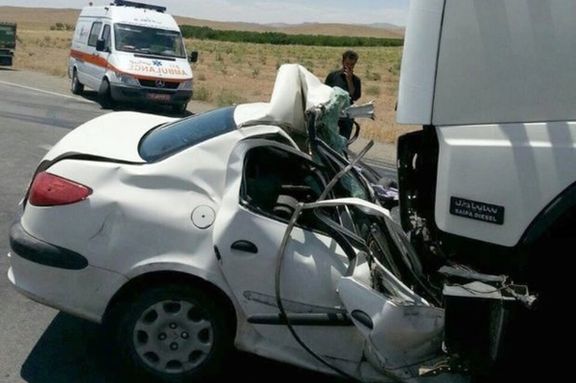
The head of Iran's Traffic Police, Hassan Momeni, reported a surge in road accidents across the country.
During a press conference held in Tehran on Tuesday, Momeni disclosed that over 20,000 lives were lost in the past year due to road-related incidents.
Last year, 17,000 deaths were recorded between March 2021 and March 2022.
The Traffic Police head provided a historical perspective, revealing that in the 2000s, the annual death toll reached 28,000 but gradually decreased to around 16,000 in 2016.
Identifying key factors leading to accidents, Momeni underscored “excessive speed, lack of attention to the road, overtaking, fatigue, and drowsiness as the primary causes.”
Nowruz, the Iranian New Year holidays, emerged as one of the deadliest periods for road accidents. This year alone, the country witnessed a staggering 85,000 accidents and 871 reported deaths during the Nowruz holidays (March 21- April 2).
However, Teymour Hosseini, the Traffic Police deputy chief downplayed the country’s poor and ageing vehicle standards and the dangerous quality of the country's roads which lack maintenance, as significant contributors to accidents.
Additionally, authorities in Iran say that 43% of traffic accident fatalities lose their lives after being transferred to the hospital, citing "failure to diagnose brain injury or internal bleeding" and "medical errors" as key causes.
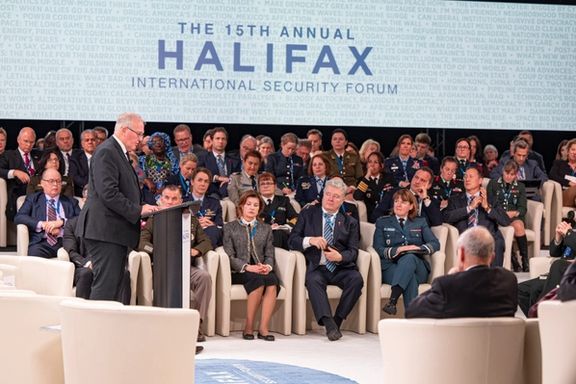
Senior scholars held an event in Canada, discussing pressing global security concerns with a focus on the alliance by China, Russia, Iran and North Korea (CRINK).
About 300 influential Western figures, including military leaders, lawmakers, diplomats, scholars, and activists wrapped up the 2023 Halifax International Security Forum (HISF) Sunday, after three days of expert panels covering a wide range of topics. The discussions revolved around the challenges posed by CRINK, an acronym derived from the initials of the four nations that have been directly or indirectly involved in numerous military conflicts worldwide.
The summit delved into various themes, with a significant emphasis on the ongoing conflict in Ukraine and the conflict between Israel and Hamas. Notably, the alignment of China, Russia, Iran, and North Korea was identified as a substantial threat to the established world order. Leaders of these countries, including Iran’s ruler Ali Khamenei, have repeatedly talked of a new global order not based on Western values.
After opening remarks on the first day of the event, Canada’s Minister of National Defense Bill Blair -- who co-hosted the 15th annual forum with the founding President of forum Peter Van Praagh -- answered to Iran International's Mahsa Mortazavi who asked about Canada's possible plans against the Islamic Republic's influence and its entrenchment into the Canadian society.
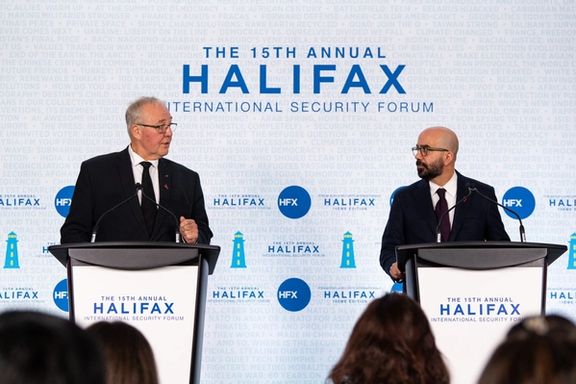
“Canada has already listed Iran as a state sponsor of terrorism which on a level of international law is a very significant and serious determination,” Blair said, when asked why Canada is not following its ally the US in designating Iran’s Revolutionary Guards as a terrorist organization. He noted that “part of Iran's export of terrorism is through the Quds force,” referring to the IRGC’s extraterritorial wing. “We've already listed those as a terrorist entity.”
About agents of Iran’s Revolutionary Guards active in Canada, Blair said, “I want to assure Iranian Canadians we understand how concerning the activities of the IRGC is. We believe that it is necessary to do more, and that work is ongoing.”
In one of the panel discussions, US Senator Jim Risch (R-ID) argued that the Middle East conflicts are fueled and funded by the Islamic Republic. “It is all Iran, whether Hamas, Hezbollah or Houthis, it is all Iran.”
Masih Alinejad, in a panel discussion with some fellow dissident activists, said “It's a shame that the US government designated the Revolutionary Guards as a terrorist organization, but the US allies are still hesitating to do the simple thing.”
Claiming that Iran’s Khamenei, Russia’s President Vladimir Putin, China’s Xi Jinping are “more united than Democratic countries,” Alinejad called for specific measures to counter the global threats Iran poses. "First, criminalize the Revolutionary Guards as a terrorist organization," she said, adding that the second is ridding Canada from the IRGC agents. She claimed there are over 700 IRGC agents "living luxury lives” in Canada. “Kick them out not because they are the threats for us Iranians, they are threats for democracy; for Canadians as well.”
Participants expressed concerns about the volatile situations in the Middle East, the South China Sea, and the Russia-Ukraine conflict, considering them potential hotbeds that could escalate into broader global conflicts. There was a consensus among democratic nations that unity is crucial to counterbalance the influence of the CRINK alliance.
Islamic Republic hardliners claim that closer economic and political relations with the East and Asian countries, which Khamenei has promulgated with the catchphrase "Looking East", will help Iran's development and strengthen it against Western powers, particularly the United States. Since 2018, and Khamenei's advocation of the policy, "Looking East" has become one of the centerpieces of a 'revolutionary economy' which hardliners have been hard at work to theorize and promote.
Almost all the experts were unanimous that the Middle East, particularly the ongoing Israel-Hamas war, and the crisis in South China Sea over Taiwan are the critical flashpoints, from which the conflicts can escalate into bigger wars. Additionally, the Russia-Ukraine conflict was highlighted in several panels, with global leaders stressing the importance of supporting Ukraine in resisting the Russian aggression.
Activists and experts urged the US to send a significant amount of weaponry so that Ukraine can come out a winner from the almost two-year war with Russia. Garry Kasparov, a former World Chess Champion-turned-political activist, told US military men present at the event that the arms needed by Ukraine to win the war “are collecting dust in Pentagon storehouses.”
The Halifax International Security Forum presents an award annually in honor of US Sen. John McCain, who died in 2018, to “individuals from any country who have demonstrated uncommon leadership in the pursuit of human justice.” “On the 75th anniversary of Israel’s creation, and in the aftermath of the October 7 attack that resulted in the greatest loss of life to the Jewish people since the Holocaust, it is fitting to present an award that bears Senator McCain’s name to: The People of Israel,” a statement by the security forum read.
As the HISF concluded, the consensus among democratic nations was clear: a united front is essential to address the destabilizing activities orchestrated by the CRINK alliance and to uphold the principles of the global world order.
Journalist Josh Rogin, who hosted one of the panels, said, “The bottom line is that … we're entering into a bipolar world... our adversaries are teaming up against us in Ukraine, in Israel, in Europe, and in the Pacific.”
“Iran is arming Russia and Hamas; North Korea is exporting weapons to Russia to use against Ukrainians; Russia and China are teaming up to help Hamas diplomatically; and China is helping Russia and Iran evade sanctions and continue their aggression,” he said, stating that “these conflicts are intertwined and therefore our response needs to be intertwined.”
As Kasparov put it, the leaders of CRINK exactly say what they are going to do, and they are delivering on their promises. He explained that Putin had talked of annexation of lands he deemed as part of Russia, or China’s Xi has been vocal about taking over Taiwan, and Iran’s Khamenei has been trumpeting his prophecy of Israel’s annihilation. He said the world should take their threats at face value.
“At times like this, conferences like this one matter. Threats to international stability are on the rise – and in the face of those threats, we’ve got to work together. We must learn from one another and share experiences. We must step up to address these challenges, and to preserve peace and prosperity for our peoples. Together, I’m confident that we can build a safer world. We can ensure that our militaries are ready to face the threats of tomorrow. And ultimately, we can protect and strengthen the rules-based international order that keeps us all safe.”
Bill Blair, Canada's Minister of National Defense
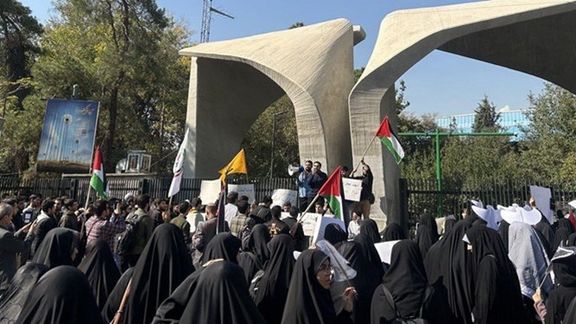
The Islamic Republic enlists foreign students, training them as ideological emissaries for deployment in other nations, according to an audio file leaked on Sunday.
The speaker, purported to be Hamidreza Haddadpour, head of the International Affairs Center for Supreme Leader Ali Khamenei’s university representatives network, reveals that recruiting foreign students establishes an ideological foothold for the Islamic Republic in the region and beyond, citing past success.
The speaker notes that many of these students are the offspring of “influential individuals in their countries who may inherit their fathers' positions.”
In the same speech, Haddadpour discloses that several meetings at Khamenei’s office led to the decision, under Khamenei's directive, to hire international students on a contractual basis. Notably, the job title "cultural secretaries" was deliberately chosen to avoid causing sensitivities in their respective countries, steering clear of titles like propagandist or teacher.
He also says Ghasem Soleimani, the former commander of the Revolutionary Guards’ extraterritorial arm, the Qods (Quds) Force, had been adamant that the Islamic Republic should pay serious attention to the role international students in advancing the Islamic Republic's cause in other nations. Soleimani had actively advocated for the government to address obstacles hindering the involvement of international students and had written letters to that effect.
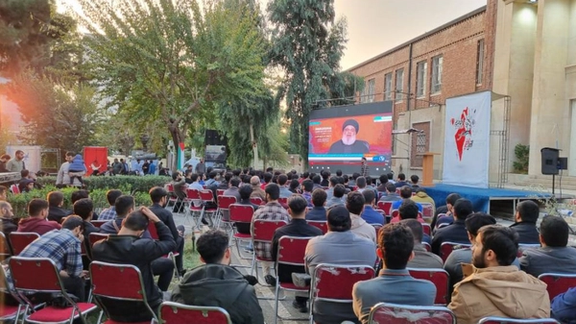
The audio file was part of a collection of classified documents released by a hacker group called Ghiyam ta Sarnegouni (Uprising till Overthrow), affiliated with the People's Mojahedin Khalq Organization (MEK). They published these documents on their Telegram account on Sunday.
Ghiyam ta Sarnegouni has on several previous occasions released classified documents which it claims were acquired by gaining control over hundreds of websites and servers of various government and state organizations such as the Ministry of Science in September. In a Telegram post a few hours after releasing the audio file and other documents, the hacker group said it still had control over the website of Khamenei representatives’ network in universities (nahad.ir).
Iran's Health Minister Bahram Eynollahi emphasized the significance of providing education to foreign students, stating that the Islamic Republic could "export the Islamic Revolution" through them. "Foreign students trained in Iran have become effective propagandists for the Islamic Republic in their countries,” he told a meeting of the government ministers in the Supreme Council of the Cultural Revolution in September 2021.
The Islamic Republic provides ample study opportunities at its numerous seminaries and Al-Mustafa International University in Qom, a state-funded Shiite seminary functioning like a university under Khamenei's control.
Al-Mustafa University, with branches in over fifty countries, sponsors hundreds of foreign students annually, from China to Africa and Latin America, enabling them to study in Iran. The intention is for these students to return to their respective countries and promote Iran’s version of Shiism.
In 2020, the university received a budget of nearly 5 trillion rials, approximately $100 million based on the official exchange rate at that time. This amount surpasses the budget of any other university in Iran.
The United States Treasury imposed sanctions on Al-Mustafa University in December 2020 for its alleged involvement in recruiting Afghan and Pakistani students to fight in Syria. Canada also imposed sanctions on Al-Mustafa University for recruiting foreign fighters in October 2022.
In early September, the Islamic Republic agreed to provide tuition to members of Iraq's Shiite Hashd al-Shaabi militias at Tehran University. The decision was made during a meeting attended by the head of Supreme Leader Ali Khamenei's representatives' network in universities and the education deputy of Hashd al-Shaabi, as announced by the university's public relations office.
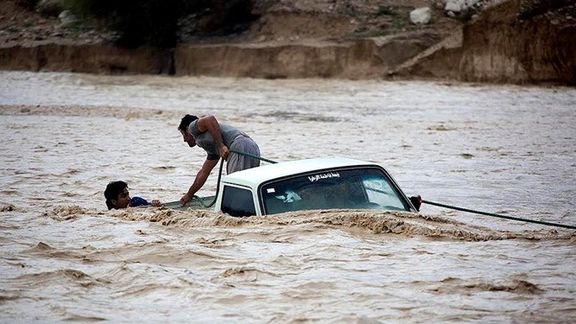
Intense rainfall has wreaked havoc in multiple regions of Iran, particularly in Ahvaz and Ilam provinces in the southwest, leading to extensive flooding and the closure of crucial roads.
In response to the alarming weather conditions, the Meteorological Organization issued red flood warnings for seven provinces on Monday. The affected areas are primarily near the Zagros Mountain range, including Khuzestan, Ilam, Fars, Kohgiluyeh and Boyer-Ahmad, Bushehr, Lorestan, and Chaharmahal and Bakhtiari provinces.
Over the past two days, heavy rainfall has disrupted communication routes in cities across Khuzestan, Lorestan, and Ilam, prompting authorities to close schools in these regions. In Ilam, educational institutions were shuttered for the afternoon shift due to continuous rainfall.
Fars News Agency reported a crisis unfolding in Ilam, attributing it to inadequate management at the provincial level. The delayed announcement of the closure of educational centers left students and teachers either stranded in schools and universities or caught in floods on the streets.
As of now, there are no reported casualties from the flooding.
In Ahvaz, floodwaters have reached parking lots and city buses. ILNA news agency reported the overflow of sewage during the recent rains, attributing it to the poor implementation of Ahvaz's sewage system. Local authorities, however, deny the crisis, describing the flooding of streets as "normal."
In Lorestan province, routes to at least 39 villages have been blocked due to flooding, according to the governor's office report. Moreover, snow has started falling in the highlands of Lorestan province.
The recurring pattern of severe weather incidents, coupled with a lack of effective response from the flood warning system and emergency teams, continues to pose a significant challenge with no solution in sight.
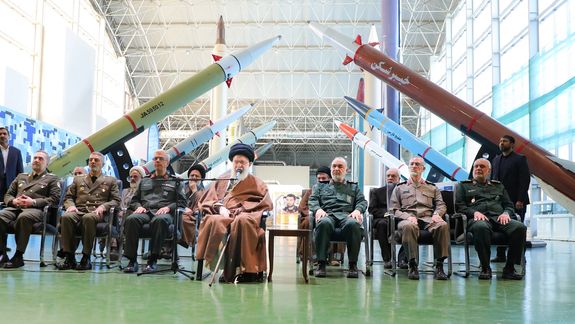
As Iran’s ruler Ali Khamenei has remained cautious over direct involvement in the Gaza war, lower ranking officials continue to speak with bluster about defeating Israel.
Mohsen Rezaei, a former Revolutionary Guard commander and a power insider in Tehran, threatened on Sunday that “New fronts will be opened in the Gaza war, and if the situation in remains grave, it would be impossible to prevent reactions by Muslim youth.”
Rezaei, who was speaking to Iran-affiliated Al Mayadeen television, hinted at other groups of the “Resistance Front” getting involved in the war and insisted that Israel will be defeated. Other Iranian officials have made similar claims since Israel launched its attacks on Gaza after Hamas’ October 7 terror attack. However, so far, the Iranian regime has not used its own military forces to respond to Israel.
Khamenei appealed to Muslim states with political ties with Israel on Sunday to at least cut them for "a limited time", state media reported on Sunday, weeks after he called for an Islamic oil and food embargo on Israel.
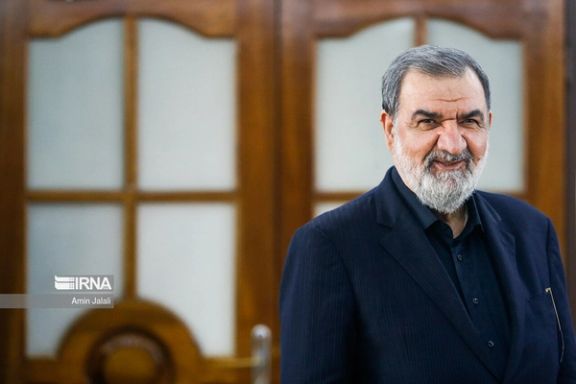
"Some Islamic governments have condemned Israeli crimes in assemblies while some have not. This is unacceptable," Khamenei said before reiterating that the main task of Islamic governments should be to cut off Israel from energy and goods.
"Islamic governments should at least cut off political ties to Israel for a limited time," Khamenei added.
This was a substantial climb-down for a man who has made Israel’s destruction the main ideological linchpin of his 34-year rule. The fact that Iran’s most powerful proxy military group, the Lebanese Hezbollah, has refrained from starting an all-out war against Israel, as Hamas faces a dire situation in Gaza, is another clear sign that Tehran is unwilling to risk everything at this stage.
In the meantime, Iran’s rulers have succeeded in securing the release of as much as $17 billion dollars that was blocked in South Korea and Iraq because of US sanctions. The Biden administration began approving the release of the funds from June, despite domestic opposition, and approved another big chunk this month, as the war raged in Gaza. The most astonishing aspect of Washington’s decision is that it came amid almost daily attacks by Iranian proxy militias on US military bases in Iraq and Syria.
It is not clear if this concession by the Biden administration is what keeps Tehran hesitant to expand the conflict, or it simply feels unease given its precarious situation at home. Since the United States imposed sanction in 2018, Iran faces an intractable economic crisis, which in turn has led to public anger and rounds of protests. The Islamic Republic faces political instability, with the ever-present specter of more popular protests.
After decades of calling for Israel’s destruction, the Islamic Republic seems to have shied away from military assistance to Hamas and is calling for a ceasefire. On Monday, President Ebrahim Raisi wrote to leaders of 50 countries asking them to use their influence to end the fighting. These included, the leaders of China, Russia, Turkey, Kazakhstan, South Africa, Kenya and Jordan. Once again Raisi asked these countries to impose economic sanctions on Israel.
However, during a joint summit between members of the Organisation for Islamic Cooperation and the Arab League in Saudi Arabia's capital on Nov. 11, Muslim states did not agree to impose wide-ranging sanctions on Israel, and Raisi had to put his name to a joint statement that actually endorsed a two-state solution – or Israel’s right to exist.